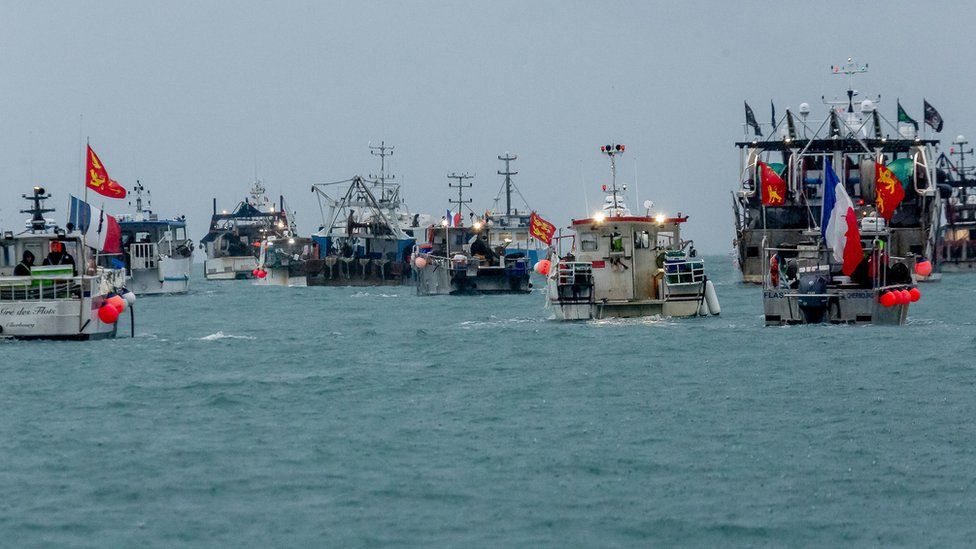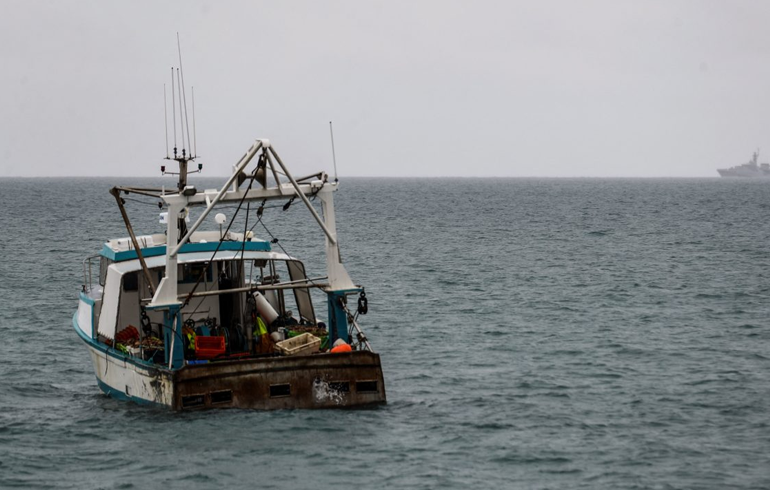A British trawler has been seized by France and another has been fined, amid an escalating row over post-Brexit fishing rights.
French maritime minister Annick Girardin said the ships were cautioned during checks off Le Havre overnight.
She said the first did not comply right away and the second was not allowed to fish in French waters so was detained.
On Wednesday, Brexit Minister Lord Frost said French threats to block UK boats from ports were “disappointing”.
Ms Girardin said on Twitter one of the British trawlers was caught fishing in the Bay of Seine without the proper licences.
She said the boat was diverted to the port of Le Havre and detained by the judicial authority, where their catch could be confiscated and the boat held until a deposit is paid.
The boat’s captain also risks penal sanctions.
Meanwhile, the other boat was fined for initially resisting the check, Ms Girardin added.
The minister said checks on the British vessels were standard during the scallop fishing season.
But she added they had also been undertaken against “the backdrop of the tightening of controls in the Channel, in the context of discussions on licenses with the United Kingdom and the European Commission”.
Barrie Deas, of the National Federation of Fishermen’s Organisations, the body representing fishermen in England, said a “tit for tat” relationship between the UK and France was “unhelpful”.
Mr Deas told BBC Radio 4’s Today programme the enforcement actions might be “normal” but were “very concerning” in the context of the French government’s threats.
He suggested more French boats fish in British waters than UK vessels fish in French waters and that a “tit for tat relationship” was not “helpful” and would leave the French fleet “much more exposed”.

France had warned that it would block British boats from some ports next week – as well as tightening checks on UK boats and trucks – if a post-Brexit dispute over fishing licences was not resolved by 2 November.
The UK said threats by France were “disproportionate” and a breach of international law and trade agreements.
Speaking before the latest development, Lord Frost said the government was seeking “urgent clarification” of France’s plans and would “consider what further action is necessary in that light”.
France was angered by a decision from the UK and Jersey last month to deny fishing licences to dozens of French boats, and argued that it breached the Brexit deal.
French trawlers previously protested outside the port of St Helier in Jersey, a British Crown dependency, with France threatening to cut off Jersey’s electricity supplies in retaliation.
On Wednesday evening, it issued its ultimatum, saying it would begin to impose “targeted measures” from Tuesday of next week, including:
Preventing British fishing boats from disembarking at ports
Increasing border and sanitary checks on UK goods
Tightening security checks on British boats
Increasing checks on trucks going to and from the UK
France said it was also preparing further sanctions, which could include cutting electricity supplies to Jersey, a British Crown dependency, as it previously threatened in May.
“The French state will continue to support its fisheries industry,” the government said, adding that it expects answers from the UK “in the next few days”.
In a statement, Lord Frost said: “It is very disappointing that France has felt it necessary to make threats late this evening against the UK fishing industry and seemingly traders more broadly.
“As we have had no formal communication from the French government on this matter we will be seeking urgent clarification of their plans. We will consider what further action is necessary in that light.”
A shot across the bows
In naval parlance, this is called a shot across the bows.
Technically, the French checks on UK trawlers in the Channel overnight do not form part of the raft of retaliatory measures announced in the fishing row.
But there should be no doubt they are intended as a message about what is to come.
From Tuesday, British and Channel Islands fishing boats will not be allowed to offload their catch at French ports.
But that is the least of it. Only 5% of UK seafood exports to France arrive in this way. The rest comes by freight.
Potentially far more disruptive will be intensified controls at Calais and other entry points for UK trade by ferry and tunnel.
The French authorities will be conducting what they call a “grève de zèle” – in other words becoming suddenly punctilious, thorough and on the look out for infractions.
And it is not just fish imports which will be checked, but everything.
The aim will be to create long tail-backs which will play on the news channels – reminding UK viewers of the costs of go-it-alone.
Downing Street said on Wednesday the “disappointing and disproportionate” threat of sanctions was “not what we would expect from a close ally and partner”.
“The measures being threatened do not appear to be compatible with the Trade and Co-operation Agreement and wider international law, and, if carried through, will be met with an appropriate and calibrated response,” a spokeswoman said.
She said that the UK will raise concerns with both the EU and French government, arguing that it had granted 98% of licence applications from European boats.
The UK maintains the rejected applications which sparked the row did not have enough supporting evidence to show they had a history of fishing in Britain’s or Jersey’s waters.
Source: BBC




















































